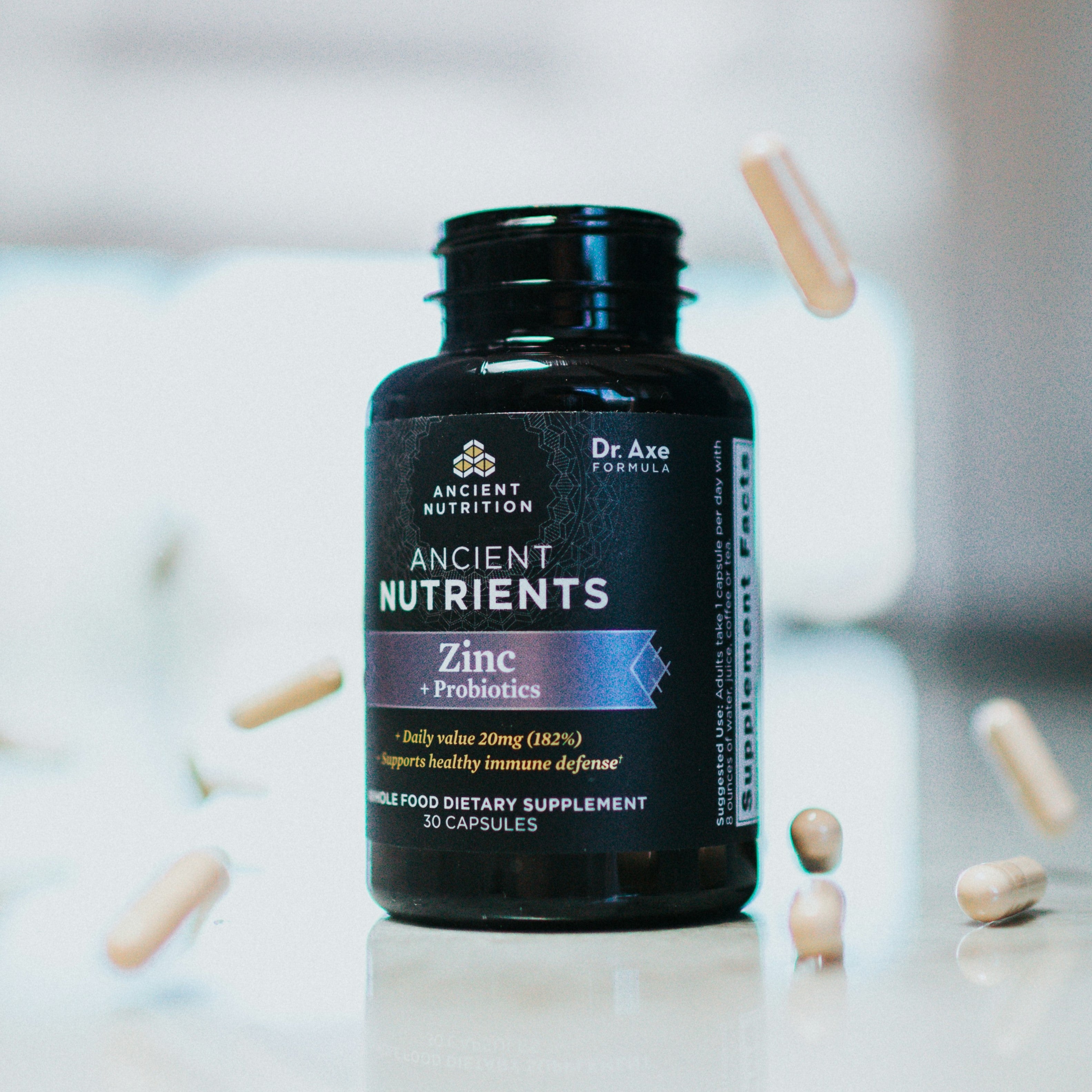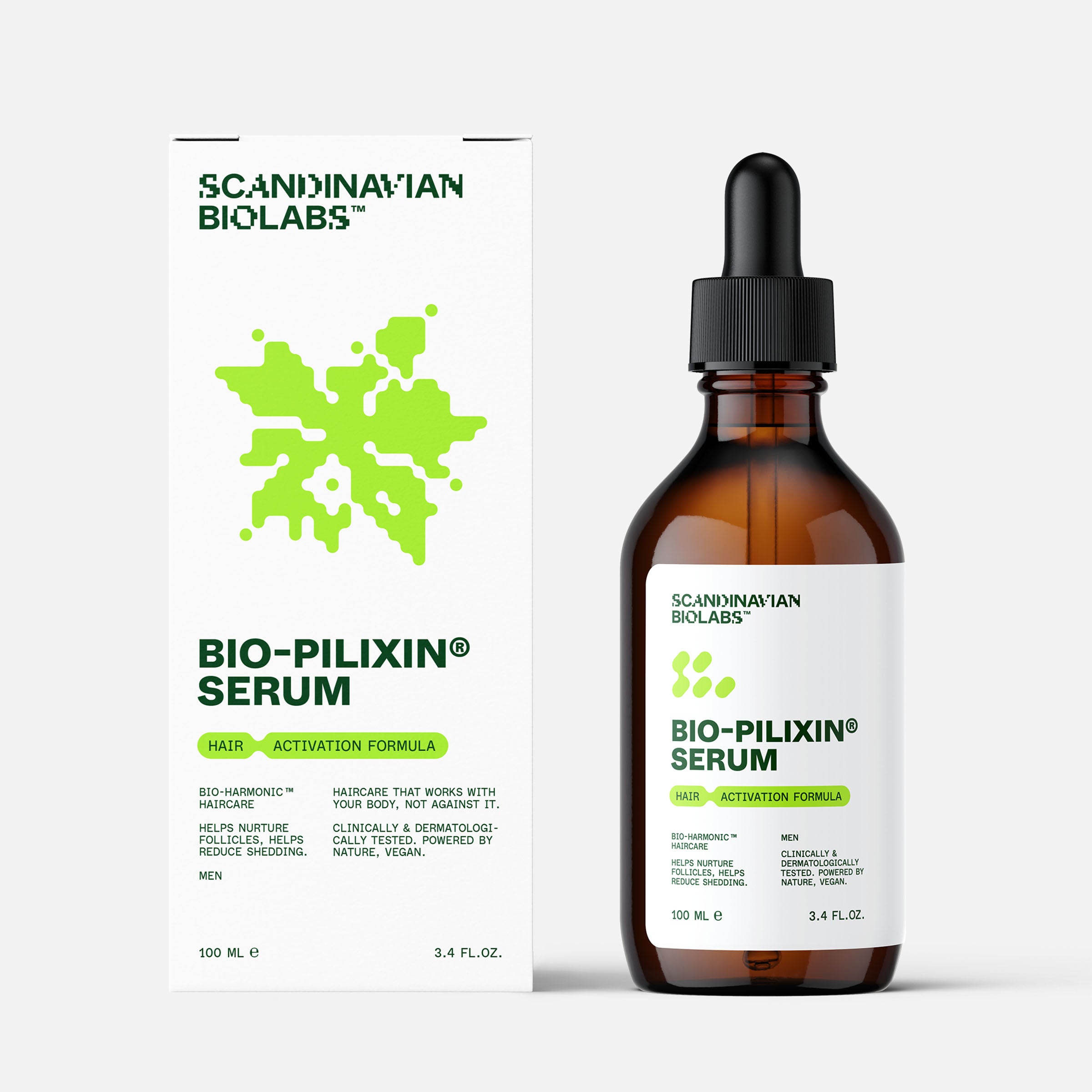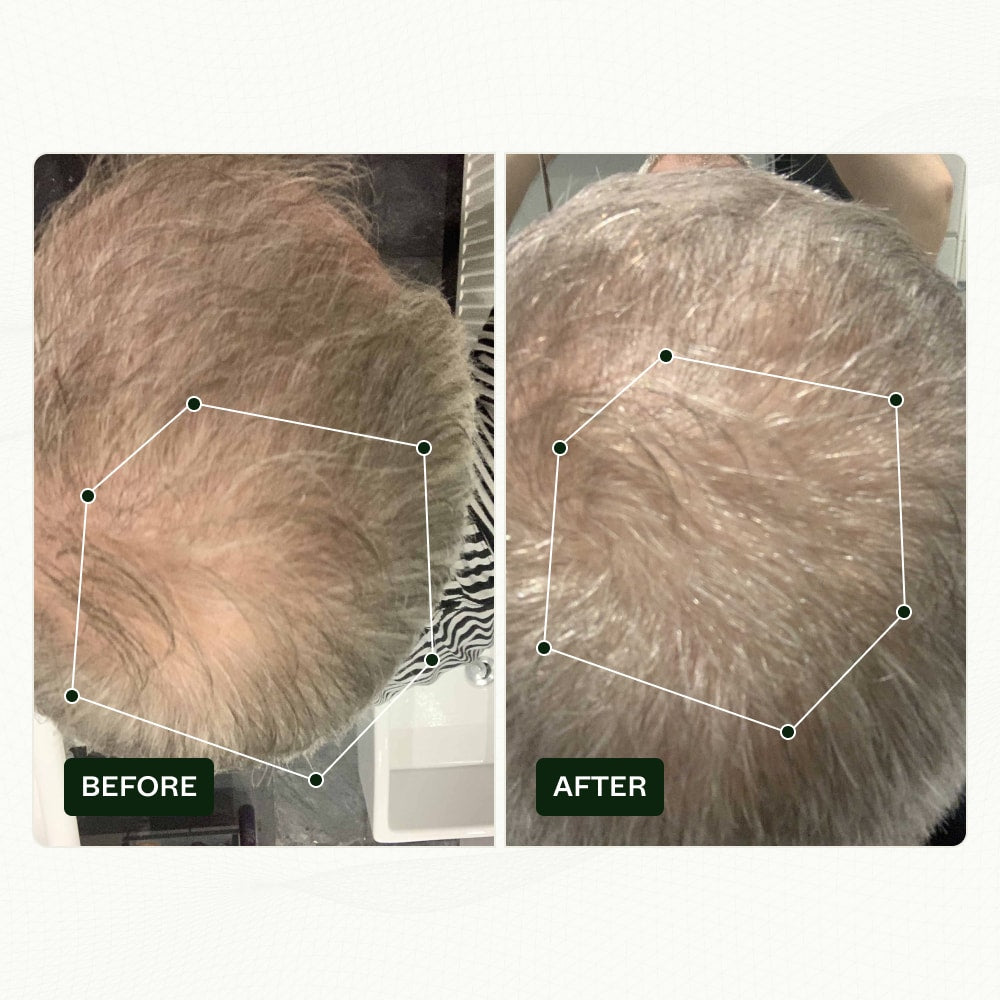Have you noticed an increase in hair falling out but can't seem to find the cause? If so, a lack of zinc may be to blame.
Zinc is an essential mineral that supports numerous functions in the body, including healthy hair.
New research is revealing that zinc deficiency could be an overlooked trigger for alopecia.
In this article, we will explore the link between inadequate zinc levels and hair loss.
Table of content
Benefits of zinc for hair growth and maintenance
Zinc promotes healthy hair growth by supporting follicle development, fortifying hair strands to reduce breakage and loss, and regulating keratin and sebum production for stronger, shinier hair.
Zinc aids in the rapid division and proliferation of hair cells, which promotes the growth of strong and resilient hair strands and contributes to overall hair health.
It provides the building blocks needed for healthy follicle development and helps fortify the foundation from which hair grows, thereby reducing the risk of hair breakage and loss.
Additionally, zinc supports and regulates keratin production, maintaining the integrity and thickness of individual hair fibers.
It also helps regulate sebum production, the natural oil produced by the scalp, ensuring that hair receives adequate lubrication and moisture. This balance is crucial for having shiny and supple hair.
However, while zinc provides the right environment for optimal hair health and prevents hair loss, it doesn’t significantly aid in hair regrowth.
As your leading source for hair health information over the past 4 years, we never compromise on accuracy. When it comes to your health, you deserve information you can truly rely on - and earning your trust is our top priority.
Here's how Scandinavian Biolabs ensures every piece of content meets the highest standards of accuracy and integrity:
- Credentialed Experts: Our reviewers are actively practicing doctors and medical researchers
- Stringent Reviews: Content undergoes rigorous editing by subject specialists and review by a practicing doctor.
- Evidence-Based: We rely on well-established research from trusted scientific sources like peer-reviewed journals and health authorities.
- Full Transparency: Our editorial standards, writer credentials, reviewer credentials, correction process, and funding are all publicly documented.
- Independent Voice: While we do promote products, we operate in a vacuum to business operations. Our main goal is just an unwavering commitment to providing medically-sound guidance.
You can count on Scandinavian Biolabs to consistently deliver the trustworthy health information you deserve. Read our Editorial Standards.
The role of zinc in hair health

Zinc plays an essential role in hair health and growth by supporting hair follicles and oil glands. As a crucial trace mineral, it is required for many biochemical reactions in the body, including those related to hair follicle function and hair shaft production. On a cellular level, zinc promotes hair health through its involvement in protein synthesis and enzyme activation.
According to Dr. Shlomo Widder, "Zinc helps support hair follicles and oil glands, and deficiency can contribute to hair loss. While zinc may help improve hair loss for some, it typically requires 2-3 months of use to see results and works best when combined with other treatments."
Keratin production
Zinc is necessary for the production of keratin, which is the structural protein that makes up hair strands, nails, and skin. Keratin gives hair its durability, elasticity, and resistance to damage. Without sufficient zinc intake, keratin levels drop, leading to weak, limp hair that is prone to breaking or seborrheic dermatitis.
Hair growth cycles
The hair follicles undergo distinct growth phases (anagen, catagen, telogen) that are regulated by enzymes and proteins. Zinc serves as a cofactor for these proteins and enzymes involved in the hair cycle, such as those found in dermal papilla cells at the base of follicles. Zinc ensures the follicles and dermal papilla function properly to support typical hair growth cycles.
Follicle integrity
Healthy follicles are essential for hair growth. Zinc supports follicle membrane integrity and supports the metabolism of follicular cells. This keeps follicles nourished and intact so they can effectively produce strong hair fibers through the growth cycles.
Adequate zinc levels are connected to fundamental hair-related processes at the cellular level. Maintaining sufficient zinc stores supports optimal keratin production, enzyme activity, and follicle functioning for continuous hair growth and strong, durable strands. Zinc is also responsible for your immune function, which could be the reason why you are seeing grey hair.
Does zinc deficiency cause hair loss?
Yes, zinc deficiency can cause hair loss. Zinc plays a vital role in hair follicle function and growth. Lacking zinc disrupts hair production and weakens strands, leading to shedding and thinning over time.
Zinc is required to produce keratin, the structural protein that makes up hair. It also supports enzymes involved in hair growth cycles. Severe deficiency causes sparse, brittle hair called acrodermatitis enteropathica. Mild deficiencies impact hair thickness, volume, and health by lowering keratin production and disrupting the growth cycle enzymes in hair follicles and dermal papilla cells at the base of follicles. This leads to shorter growth phases and increased shedding over time.
What happens when you have a zinc deficiency?

Lack of zinc has increased prevalence in developing countries, owing to malnutrition, while mild to moderate cases may also emerge in developed regions. The human body is incapable of synthesizing zinc, hence, the only source of nutrition is food and supplements.
According to the FDA, the average dietary intake of zinc is 3mg/day in children, 8mg/day in adult females, 11mg/day in adult males, and higher quantities for women who are either pregnant or lactating.
Zinc deficiency is an interplay between malnutrition and chronic illnesses predominant in developing and developed countries respectively. Nutritional causes include the consumption of phytates and oxalates that suppress zinc absorption as well as reduced intake of meat.
On the contrary, chronic illnesses involve multiple organs and systems including gastrointestinal, metabolic, hepatic, hematologic, renal, and immune-related disorders.
Approximately 17,3% of the world population is susceptible to developing zinc deficiency. Zinc deficiency may be congenital or acquired. The congenital form of zinc deficiency is marked by intestinal abnormalities that lead to impaired intestinal absorption of zinc, for instance, acrodermatitis enteropathica.
Acquired zinc deficiency arises when an individual does not consume sufficient dietary zinc, is unable to absorb zinc, is subjected to excessive loss of zinc, or dietary zinc does not fulfill increased metabolic demand. Certain medications and luminal contents impair absorption while physiological states such as pregnancy and lactation tend to increase the metabolic demand.
Lastly, excess zinc loss occurs in the presence of diarrhea, hemodialysis, and burns.
Is zinc good for hair growth?

Yes, zinc is essential for hair growth and overall hair health. Zinc plays several crucial roles in maintaining healthy hair, including:
- Protein synthesis: Hair is primarily made of a protein called keratin. Zinc is involved in the synthesis of proteins, ensuring that hair grows strong and healthy.
- Cell growth and division: Hair growth relies on the constant division and growth of cells in the hair follicles. Zinc is essential for proper cell growth, which in turn, supports healthy hair growth.
- Maintaining the hair growth cycle: The hair growth cycle consists of three phases - anagen (growth), catagen (transition), and telogen (resting). Zinc helps maintain a healthy balance between these phases, ensuring that the hair grows and sheds at a normal rate.
- Antioxidant properties: Zinc acts as an antioxidant, protecting hair follicles from damage caused by free radicals and oxidative stress. This helps maintain the health and integrity of the hair follicles, promoting hair growth.
- Hormonal regulation: Zinc plays a role in hormone regulation, particularly in the production of thyroid hormones. Hormonal imbalances, such as those caused by thyroid disorders, can lead to hair loss or thinning. Ensuring adequate zinc intake can help maintain hormonal balance and support hair growth.
However, it's important to note that while zinc is essential for hair growth, excessive zinc can be harmful and lead to hair thinning.
Maintaining a balanced diet that includes zinc-rich foods or taking appropriate zinc supplements (after consulting with a healthcare professional) is the best approach to ensure optimal hair growth and overall health.
The science behind zinc for hair loss
For some, alopecia may be a sign of zinc deficiency. The association between zinc and hair physiology is further strengthened by the fact that zinc supplementation results in improved hair growth.
Research studies show that zinc deficiency has a significant association with the onset of telogen effluvium. The deficiency of zinc and other trace elements disrupt the normal hair cycle.
This also accelerates hair regression and causes excessive hair loss. Karashima et al. conducted a case series comprising patients suffering from telogen effluvium with concomitant zinc deficiency. These patients also present with patchy alopecia.
Oral zinc supplementation with polaprezinc cured or improved hair loss in the patients included in the case series.
How to get enough zinc for your hair health?

Zinc is an essential mineral that plays a key role in hair growth and thickness. Not getting enough zinc can lead to hair loss and breakage over time. Here are some effective ways to ensure you're meeting your zinc needs:
Eat zinc rich foods
The most natural way to get zinc into your diet. Some of the best dietary sources of zinc include oysters, beef, lamb, chickpeas, pumpkin seeds, cashews, and yogurt. Aim to include a zinc rich food in your diet each day. For example, have eggs or cashew cereal for breakfast, and a beef or chickpea dish for lunch or dinner.
Take zinc supplements
If you have trouble getting enough zinc from your regular diet, consider zinc supplements. Look for formulations containing 10-15mg of elemental zinc per day. Be sure not to exceed the upper intake level of 40mg daily.
Massage zinc shampoo into your scalp
Many anti-hair loss zinc pyrithione shampoos stimulate follicles from within. Incorporate a zinc shampoo into your hair care routine and gently massage it into your scalp for a few minutes before rinsing for an extra boost.
By giving your body enough zinc rich foods, you'll be able to regain healthy hair and scalp in no time.
How to deal with zinc-related hair loss?
Obviously, the first thing you should do is ensure that you have the recommended level of zinc, either through diet or using a zinc supplement.
Zinc is a very important building block, thus many hair growth supplements include this ingredient.
Afterward, if you want to give your hair loss that knockout punch, consider these options:
Hair products

If you've arrived here with concerns about hair loss, perhaps intrigued by the role of minerals like zinc, you're on the right path to discovering a solution that addresses hair loss at its roots—quite literally. While zinc is essential for hair health, the journey to fuller, thicker hair doesn't stop there. Our groundbreaking Bio-Pilixin® Activation Serum transcends traditional treatments by harnessing the power of advanced stem cell technology and plant growth factors to improve your hair growth environment.
Why Bio-Pilixin® Stands Out
- Clinically Tested Results: Developed by experts, our serum has shown remarkable outcomes in as little as 45 days, with a significant reduction in hair loss and encouraging new growth evident in clinical studies.
- Advanced Plant Growth Factors: Utilizing Capilia Longa®, a natural compound proven to dramatically decrease hair loss and boost hair density, our formula sets a new standard in hair revitalization.
- Safe and Nourishing Ingredients: Including Niacinamide for keratin production and Vanillyl Butyl Ether to stimulate scalp blood flow, every component of our serum is chosen for its efficacy and safety, ensuring your hair receives the best care without compromise.

Join the ranks of satisfied users who've experienced transformational changes in their hair's health and appearance. With a 93% satisfaction rate in our clinical studies, the results speak for themselves. From reduced hair fall to noticeable improvements in hair density, the benefits of incorporating Bio-Pilixin® into your daily routine are undeniable.
Hair supplements
Zinc deficiency is not the only deficiency that can cause hair loss. A diet lacking in vitamin A, vitamin B (especially vitamin B12), vitamin C, vitamin D, and vitamin E are just as harmful to your hair growth.
The first step is to understand what nutrients are lacking in your body, and then pick the right supplement to target those missing vitamins and minerals.
Try to focus on supplements that are exactly what you need and are also designed for easy absorption.
We recommend a supplement that has biotin, as it's a known vitamin that's extremely beneficial for your hair.
Hair growth medications
Hair growth medications work to stop or slow down alopecia by blocking the effects of DHT (dihydrotestosterone), a hormone that shrinks hair follicles. Some common prescription hair growth medications include minoxidil (Rogaine), finasteride (Propecia), and dutasteride (Avodart).
These medications come in topical solutions, oral pills, or both. They've been shown to stimulate hair growth or regrow lost hair in many users when used continuously.
However, hair growth stops once the medication is discontinued and with time, androgenetic alopecia will return. Side effects can include irritation, redness, or unwanted heart conditions with long-term use. Topical solutions also require daily application to see results.
Minoxidil is approved for both female and male pattern baldness, but finasteride is only approved for male pattern baldness.
Hair transplants
A hair transplant is a surgical procedure that permanently moves hair follicles from areas of your scalp where hair grows abundantly (usually the back and sides) to balding or thinning areas. During a hair transplant, a surgeon removes tiny plugs of skin, each containing 1 to 4 hair follicles, from the donor areas. They are then implanted in the thinning or balding regions of your scalp.
Hair transplants are effective for treating balding, but the results are generally gradual, and it can take over a year to see the full effect of the implanted follicles. Multiple sessions may be required to achieve a natural hairline or completely cover a bald scalp. This is usually the most expensive option to treat androgenetic alopecia.
FAQs
How much zinc do you need for hair loss?

Zinc supplementation for hair loss disorders is a debatable topic. Different zinc oral supplementation have different effects on hair growth. Park et al. conducted a study to assess the effect of oral zinc gluconate on hair regrowth in patients suffering from alopecia areata.
Park et al. administered oral zinc gluconate supplementation of 50 mg/T/day to alopecia areata patients and recorded hair regrowth to assess the therapeutic effects of oral zinc gluconate. The patients were categorized into positive and negative response groups based on the serum zinc level in these individuals.
Improvement in serum zinc levels in these patients has a direct association with improved hair growth in patients belonging to the positive response growth. Serum zinc levels did not increase significantly in individuals who belong to the negative response group.
It also helps to take a supplement rich in hair vitamins that help in hair loss treatment and combat hair fall.
How to know if you have a zinc deficiency?
Some signs of zinc deficiency you can see at home include thinning hair, hair loss, slowed wound healing, poor immune function, acne, and decreased sense of taste and smell.
Professionally, zinc levels can also be checked via a blood test or hair mineral analysis from your doctor.
How long do you have to use supplements until you see hair growth?
Most studies supplementing zinc for hair loss saw improvements within 3-6 months. However, full regrowth may take 6-12 months as hair typically grows back slowly at a rate of 1/2 inch per month. Consistency is key to give zinc time to accumulate in the body and nourish follicles for healthier hair growth.
Read more:
- Stinging Nettle for Hair Loss: Does It Work?
- Fasting Hair Loss: Definition, Causes, And Treatment Options
- Doctor On: Do DHT Blockers Work? And Why It Might Not?








